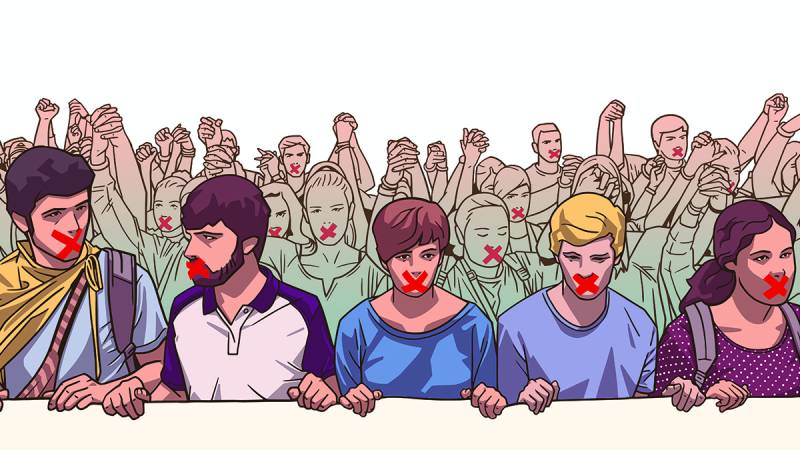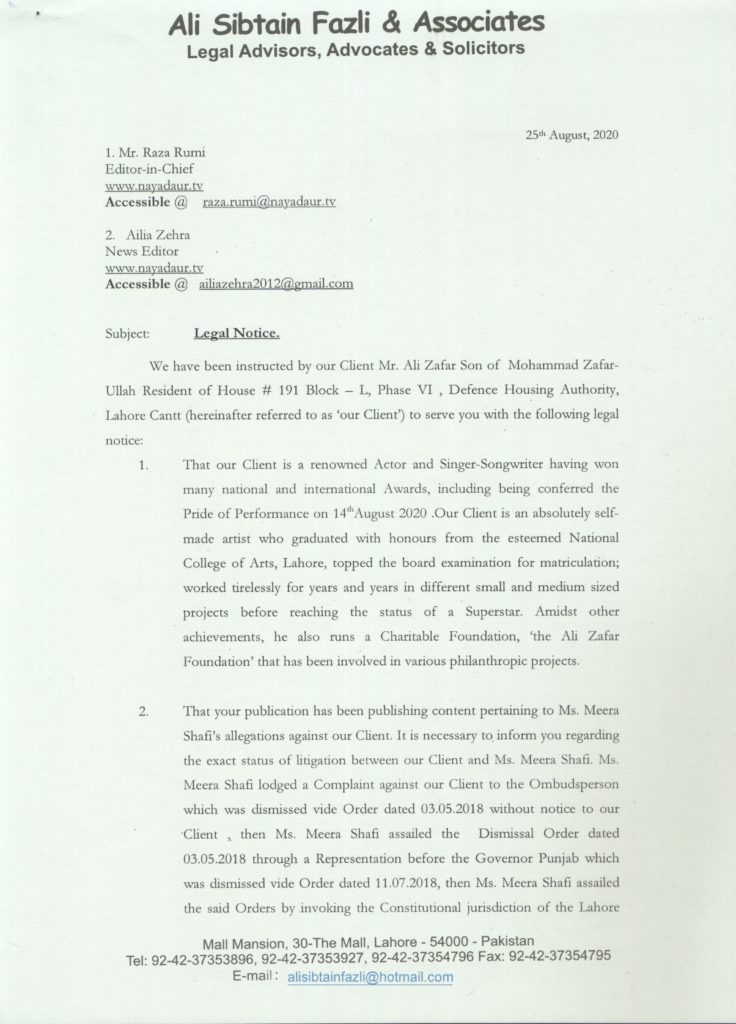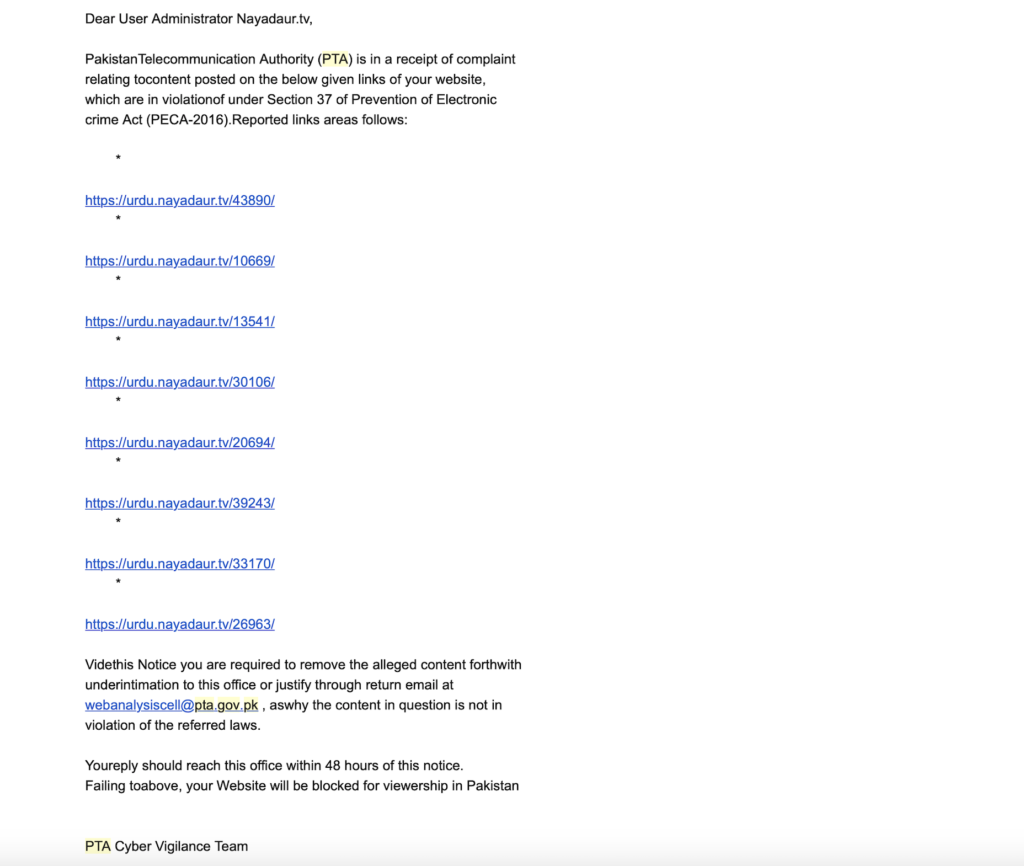
The government has notified a set of rules as a sub legislative framework to implement section 37 (unlawful online content) of the notorious Prevention of Electronic Crimes Act (Peca) 2016. The ‘Removal and Blocking of Unlawful Online Content (Procedure, Oversight and Safeguards) Rules 2020’, are a newer version of the rules that were issued by the government in February 2020. These rules are draconian to say the least. Now criticism of the government can be deemed as 'unlawful'. The rules extend to social media companies as well as the internet service providers making it legally mandatory to implement directions by Pakistan Telecommunication Authority to censor online content; and provide user data. The powers of blocking, removing or in plain terms censoring online content is at the discretion of the Pakistan Telecommunications Authority. Due process seems to have been dispensed with.
The attempts to control social media and the internet at large follow the taming of electronic media, the weaponising of advertising revenues, a widespread campaign to malign media outlets and silence critical journalists through online harassment, termination and in some cases abductions too.
Authoritarianism has returned with a bang, albeit in new bottles. Parliament has been reduced to an irrelevance and the political parties view media freedoms through the prism of whether their leaders and rallies are getting adequate 'coverage'. The judiciary, with some exceptions, thus far has played along and has in effect contributed to the emergence of the current authoritarian order. Senior media persons have celebrated the emergence of a 'hybrid regime' and the intelligentsia is divided, unorganized with some influential members even complicit in the reproduction of the old model of authoritarianism. In a few cases, journalists and activists went missing but the more insidious path has been registration of cases invoking PECA and sometimes the favourite charge of sedition that the British gifted to the Indian subcontinent.
Pakistan is not an exception to the global trends. Tyranny comes in various shapes: from the neo-fascist leaders to surveillance systems and the neoliberal order that patently undermine citizen rights. Media freedoms around the world have declined including Pakistan. But the issue with Pakistan is that censorship and denial of rights is a recurrent theme in the country's history.
The Four attempts to silence Nayadaur
I founded this platform with the idea that the space for digital media was expanding and that one could find ways to circumvent the odious corporate model that has ruined journalism everywhere. But in the few years of this platform's existence, this illusion is wearing off. The daily conversation with my colleagues - who effectively run this outlet - is ALL about the red lines. Essentially, all the big stories are out of bounds. Covering human rights abuses injures nationalism, mentioning enforced disappearances endangers national security, and asking for amendments to blasphemy law is a Western conspiracy. The ultimate bogey is that since I spend long stretches of time 'abroad', I am propagating a 'foreign agenda'. Comments on social media from the youthful trolls to ostensibly 'serious' persons incessantly fuel this suspicion.
Within the narrowly designated space by the state and society, we still manage to produce numerous multimedia stories that are often critical of those in power. Some draw the ire of the ruling party as its avid supporters view Naya Daur as an 'anti-PTI' platform. Their recent induction into notional democracy has yet to teach them that it is they, the government, who have to be held accountable, and we cannot be adherents of a cult. Since the judiciary, the army, and the foreign policy are largely no-go areas, we have tried to focus on education, sexual harassment and other issues thinking that we have some leeway here.
But that too has proved to be a struggle.
In the past few months, Naya Daur has been harassed by four legal notices for its stories. Mind you, this is still a toddler in the mediascape, learning to crawl at best. I shall begin with the most recent.
My colleague Ailia Zehra who selects the news for this website, and is not amenable to paternalistic advice, has been following up on the Ali Zafar story. I have been admirer of Ali Zafar's music and his other contributions. But harassment charges are serious and given the culture of victim-blaming and misogyny, we have to go an extra mile in Pakistan. Furthermore, I have relied on the editorial judgment of my women colleagues.
At Daily Times, I let my deputy write a strong editorial and refused to take 'advice' from the management. Ailia's recent oped and a few other reports have drawn his ire and now we have to deal with the potential legal proceedings which are expensive, time consuming and stressful.

Prior to this, NayaDaur received a notice from DAWN for publishing an interview of filmmaker Jami not conducted by NDM but by a freelance contributor. Since we exist in digital spaces, we strive to respond and engage with our audiences. While I have all the professional respect for Mr. Hameed Haroon and would be the last person to become part of any sordid campaign against him, Jami's voice simply cannot be cancelled.
This notice was followed by another legal notice by Omair Rana because our multimedia editor, Ali Warsi produced a video after the Lahore Grammar School's students came out with charges of sexual harassment against teachers and administration. Yes, we diligently covered it for days and continue to post updates.
The fourth legal notice came from the US citizen Cynthia Ritchie - working as a consultant for Pakistan military's public relations wing (ISPR) and the KP government - who after questioning my patriotism (and accusing me of working to defame Pakistan) held me personally responsible for an article written by a contributor in January 2019 and a typographical error (rectified promptly) about her statement in the court.
That notice was also posted on Twitter with all the troll farms supporting her. I had to block dozens including Ms. Ritchie.
On Twitter, our senior editor, Murtaza Solangi was heckled by a minister for sharing a story that was based on what the minister has said on Twitter itself. Irony died that very day.
https://twitter.com/FaisalVawdaPTI/status/1298604001102004226
NayaDaur have already been at the receiving end of PTA
PECA and its rules - notified or otherwise - are not new to us. We received a notice from PTA earlier this year which found our articles as violative of the law. Most of these stories were either translations of reports from the international media or news items that other outlets carried too. NDM had to remove them mainly to survive.
 Online abuse is taxing and stressful. And these notices make the team's work even more stressful. Not to mention that they are plain encroachments on free speech.
Online abuse is taxing and stressful. And these notices make the team's work even more stressful. Not to mention that they are plain encroachments on free speech.
Mercifully, at least we are only dealing with notices here. In January 2020, this website was taken down for nearly a week without notice and ultimately restored after many a pleading with the officialdom. But that was not the first time. In April 2018, the website was banned as well perhaps due to publishing of articles on-a-movement-that-I-will-not-name!
The myth of 'free' digital spaces should be laid to rest.
But should we give up? No. We are not going to accept the way those with power and clout want us to act. There is no point in publishing if not done to advance public accountability, social justice and to uphold the public interest.
This is why an odious law such as PECA needs to called as such, and curbs on free speech cannot be called anything else.
If the Parliament and the judiciary don't intervene to safeguard citizen freedoms and if the media remains divided and ready to cannibalise itself, we may have already entered another long spell of authoritarianism.
The attempts to control social media and the internet at large follow the taming of electronic media, the weaponising of advertising revenues, a widespread campaign to malign media outlets and silence critical journalists through online harassment, termination and in some cases abductions too.
Authoritarianism has returned with a bang, albeit in new bottles. Parliament has been reduced to an irrelevance and the political parties view media freedoms through the prism of whether their leaders and rallies are getting adequate 'coverage'. The judiciary, with some exceptions, thus far has played along and has in effect contributed to the emergence of the current authoritarian order. Senior media persons have celebrated the emergence of a 'hybrid regime' and the intelligentsia is divided, unorganized with some influential members even complicit in the reproduction of the old model of authoritarianism. In a few cases, journalists and activists went missing but the more insidious path has been registration of cases invoking PECA and sometimes the favourite charge of sedition that the British gifted to the Indian subcontinent.
Pakistan is not an exception to the global trends. Tyranny comes in various shapes: from the neo-fascist leaders to surveillance systems and the neoliberal order that patently undermine citizen rights. Media freedoms around the world have declined including Pakistan. But the issue with Pakistan is that censorship and denial of rights is a recurrent theme in the country's history.
The Four attempts to silence Nayadaur
I founded this platform with the idea that the space for digital media was expanding and that one could find ways to circumvent the odious corporate model that has ruined journalism everywhere. But in the few years of this platform's existence, this illusion is wearing off. The daily conversation with my colleagues - who effectively run this outlet - is ALL about the red lines. Essentially, all the big stories are out of bounds. Covering human rights abuses injures nationalism, mentioning enforced disappearances endangers national security, and asking for amendments to blasphemy law is a Western conspiracy. The ultimate bogey is that since I spend long stretches of time 'abroad', I am propagating a 'foreign agenda'. Comments on social media from the youthful trolls to ostensibly 'serious' persons incessantly fuel this suspicion.
Within the narrowly designated space by the state and society, we still manage to produce numerous multimedia stories that are often critical of those in power. Some draw the ire of the ruling party as its avid supporters view Naya Daur as an 'anti-PTI' platform. Their recent induction into notional democracy has yet to teach them that it is they, the government, who have to be held accountable, and we cannot be adherents of a cult. Since the judiciary, the army, and the foreign policy are largely no-go areas, we have tried to focus on education, sexual harassment and other issues thinking that we have some leeway here.
But that too has proved to be a struggle.
In the past few months, Naya Daur has been harassed by four legal notices for its stories. Mind you, this is still a toddler in the mediascape, learning to crawl at best. I shall begin with the most recent.
My colleague Ailia Zehra who selects the news for this website, and is not amenable to paternalistic advice, has been following up on the Ali Zafar story. I have been admirer of Ali Zafar's music and his other contributions. But harassment charges are serious and given the culture of victim-blaming and misogyny, we have to go an extra mile in Pakistan. Furthermore, I have relied on the editorial judgment of my women colleagues.
At Daily Times, I let my deputy write a strong editorial and refused to take 'advice' from the management. Ailia's recent oped and a few other reports have drawn his ire and now we have to deal with the potential legal proceedings which are expensive, time consuming and stressful.

Prior to this, NayaDaur received a notice from DAWN for publishing an interview of filmmaker Jami not conducted by NDM but by a freelance contributor. Since we exist in digital spaces, we strive to respond and engage with our audiences. While I have all the professional respect for Mr. Hameed Haroon and would be the last person to become part of any sordid campaign against him, Jami's voice simply cannot be cancelled.
This notice was followed by another legal notice by Omair Rana because our multimedia editor, Ali Warsi produced a video after the Lahore Grammar School's students came out with charges of sexual harassment against teachers and administration. Yes, we diligently covered it for days and continue to post updates.
The fourth legal notice came from the US citizen Cynthia Ritchie - working as a consultant for Pakistan military's public relations wing (ISPR) and the KP government - who after questioning my patriotism (and accusing me of working to defame Pakistan) held me personally responsible for an article written by a contributor in January 2019 and a typographical error (rectified promptly) about her statement in the court.
That notice was also posted on Twitter with all the troll farms supporting her. I had to block dozens including Ms. Ritchie.
On Twitter, our senior editor, Murtaza Solangi was heckled by a minister for sharing a story that was based on what the minister has said on Twitter itself. Irony died that very day.
https://twitter.com/FaisalVawdaPTI/status/1298604001102004226
NayaDaur have already been at the receiving end of PTA
PECA and its rules - notified or otherwise - are not new to us. We received a notice from PTA earlier this year which found our articles as violative of the law. Most of these stories were either translations of reports from the international media or news items that other outlets carried too. NDM had to remove them mainly to survive.
 Online abuse is taxing and stressful. And these notices make the team's work even more stressful. Not to mention that they are plain encroachments on free speech.
Online abuse is taxing and stressful. And these notices make the team's work even more stressful. Not to mention that they are plain encroachments on free speech.Mercifully, at least we are only dealing with notices here. In January 2020, this website was taken down for nearly a week without notice and ultimately restored after many a pleading with the officialdom. But that was not the first time. In April 2018, the website was banned as well perhaps due to publishing of articles on-a-movement-that-I-will-not-name!
The myth of 'free' digital spaces should be laid to rest.
But should we give up? No. We are not going to accept the way those with power and clout want us to act. There is no point in publishing if not done to advance public accountability, social justice and to uphold the public interest.
This is why an odious law such as PECA needs to called as such, and curbs on free speech cannot be called anything else.
If the Parliament and the judiciary don't intervene to safeguard citizen freedoms and if the media remains divided and ready to cannibalise itself, we may have already entered another long spell of authoritarianism.
